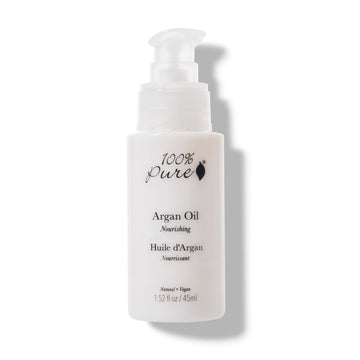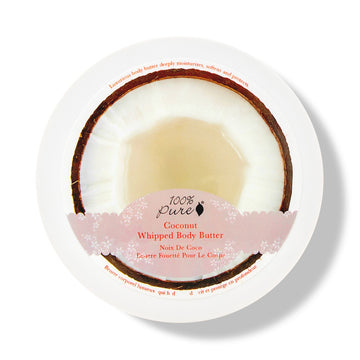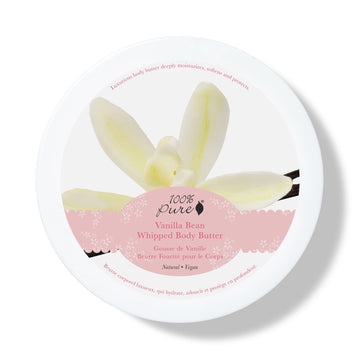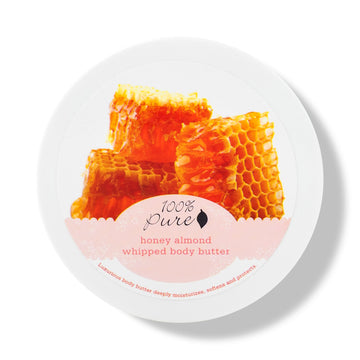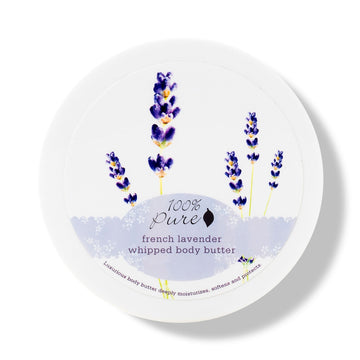Both help combat dry, rough skin – but which body care product is best for you?
Posted on March 25, 2025 Written by: 100% PURE®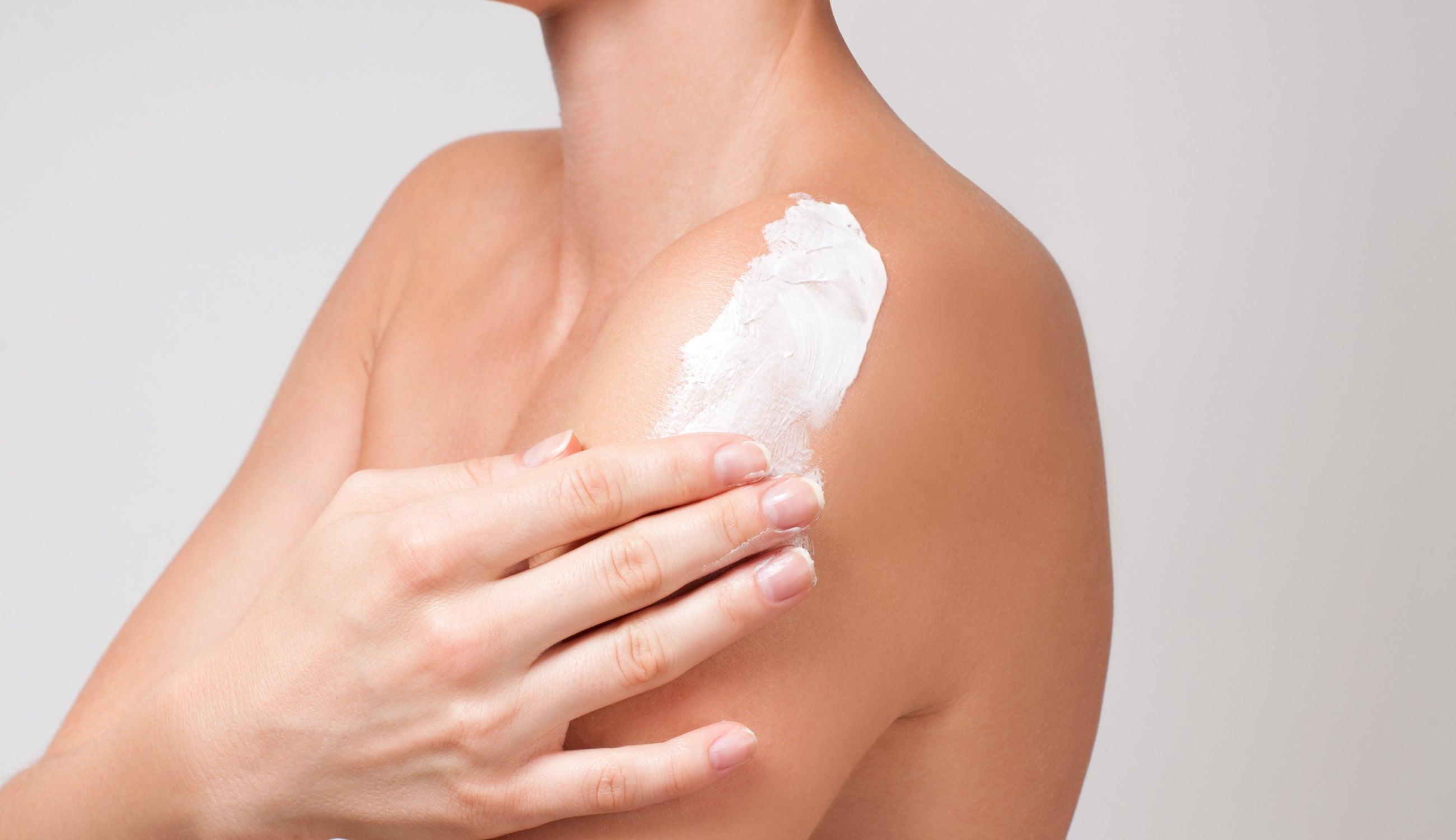
It doesn’t matter if it’s the dead of winter, or full summer meltdown – our delicate skin NEEDS a little tender love and care. And when we say “care”, slathering on some body butter or body lotion to treat our dry, parched skin will do just fine. It’s not a matter of whether I should moisturize my skin – it’s an important choice of what do I use to properly moisturize my skin?
While many go straight for body butter as their standard body treatment, you might not be grabbing the proper skin care product to get the job done right. It’s a hot debate, but we’re ready to tackle it: body butter vs. body lotion – who will reign supreme in our body moisturizer head-to-head?
Follow along below, while we cover when you should be using body butter, vs. when you should be using body lotion.
Body butter is the creme de la creme of natural body products. Our thick, luxurious body butter is on-call for the times when your skin is yearning for intense hydration. Body butter is specifically designed to replenish much-needed moisture back into parched, desert-esque skin.
The key to deeply moisturizing and softening your skin is the healing base of natural butters. We’ve whipped avocado, shea, and cocoa butter into a thich, luxurious spread; think of these three body butter ingredients as the skin healing trifecta. Additional lifesavers are vitamin-rich argan oil, anti-aging rosehip seed oil, and to top it off, we’ve included skin-restorative vitamin E.
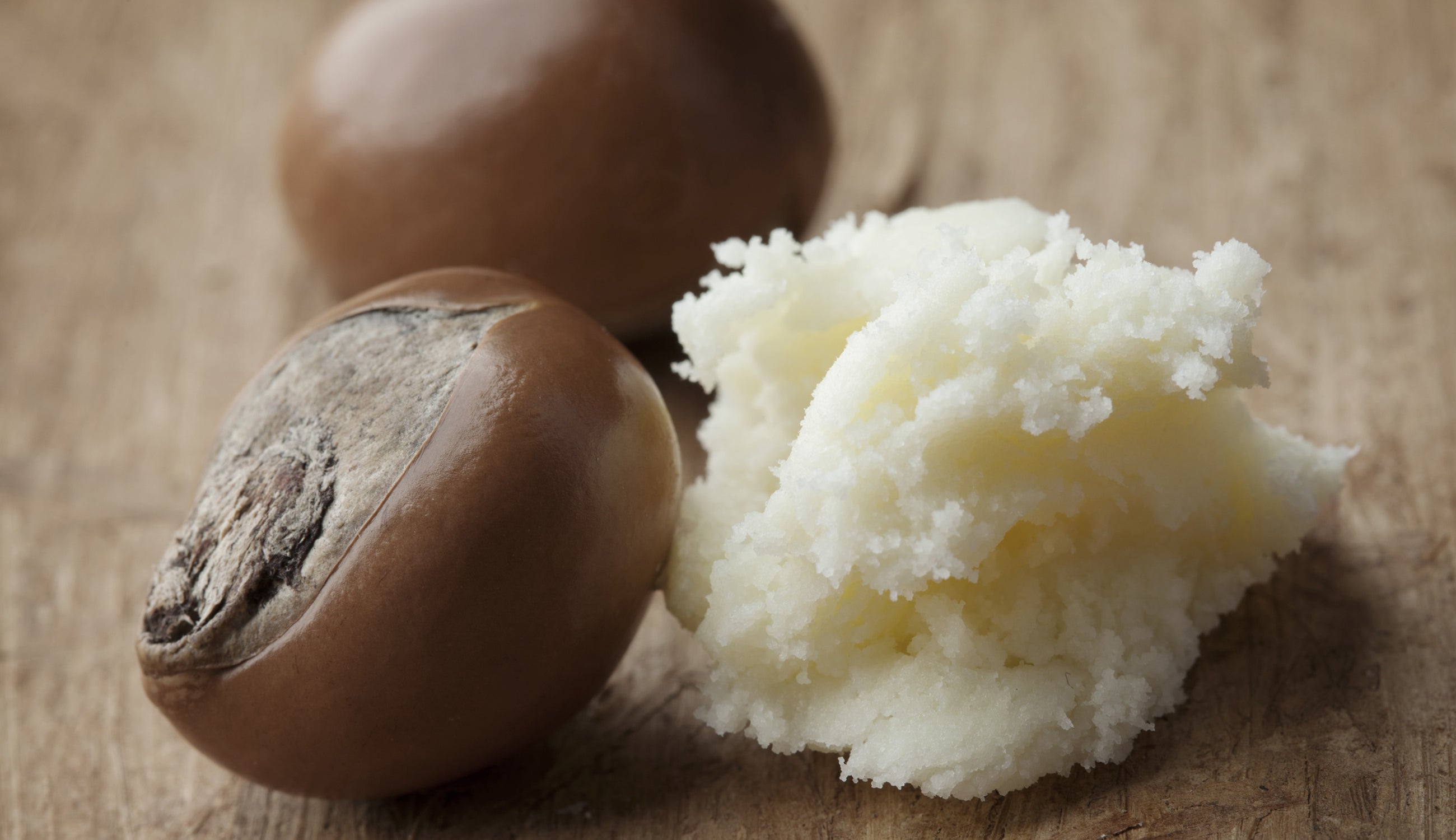
What makes our body butters so special? The short answer: a lot. Our body butter is made with the highest quality natural ingredients, which are super beneficial for all dry skin woes. We’ve mixed, whipped, and lovingly blended ten special body butter scents to please everyone in the crowd; from spa-worthy Honey Almond Whipped Body Butter to the tropical getaway in a tub, coconut body butter.
Our natural body butters are packed with an amazing assortment of skin healing ingredients that will help heal, soften, and replenish dry skin types in need of a serious water and oil infusion. Check out these top 5 body butter hero ingredients:
- Cocoa Butter
Cocoa butter was a no-brainer base for our body butter formula because of its high amount of fatty acids. This ingredient provides deep hydration and nourishing fat to help improve skin elasticity, while creating a protective barrier on top of your skin to seal in moisture. - Avocado Butter
Did you know that avocado butter can help our resistance to ultraviolet rays? It’s a low-grade natural sunscreen as well as a top moisturizing tool. Joining the trifecta of fatty acids, avocado butter is an excellent source of vitamin e, potassium, and lecithin, which all work together to nourish and moisturize the skin. - Shea Butter
Rounding out the butter trio, shea butter also joins the list of highly concentrated fatty acids that work to soften and heal parched skin. Shea butter is packed full of vitamins and is prized for its anti-inflammatory and skin healing properties. - Argan Oil
Who’s packed with skin beneficial omega fatty acids, vitamin e, and linoleic acids? Argan oil is! This feather-light moisturizer is essential for restoring moisture and hydration to tough, dry skin patches. - Vitamin E
Known for its skin healing properties, vitamin e was included as another star body butter ingredient. Not only can vitamin e help to reduce the appearance of scars but it doubles down to deeply moisturize thirsty skin.
Newsletter Subscribe
for more blog updates and exclusive discounts
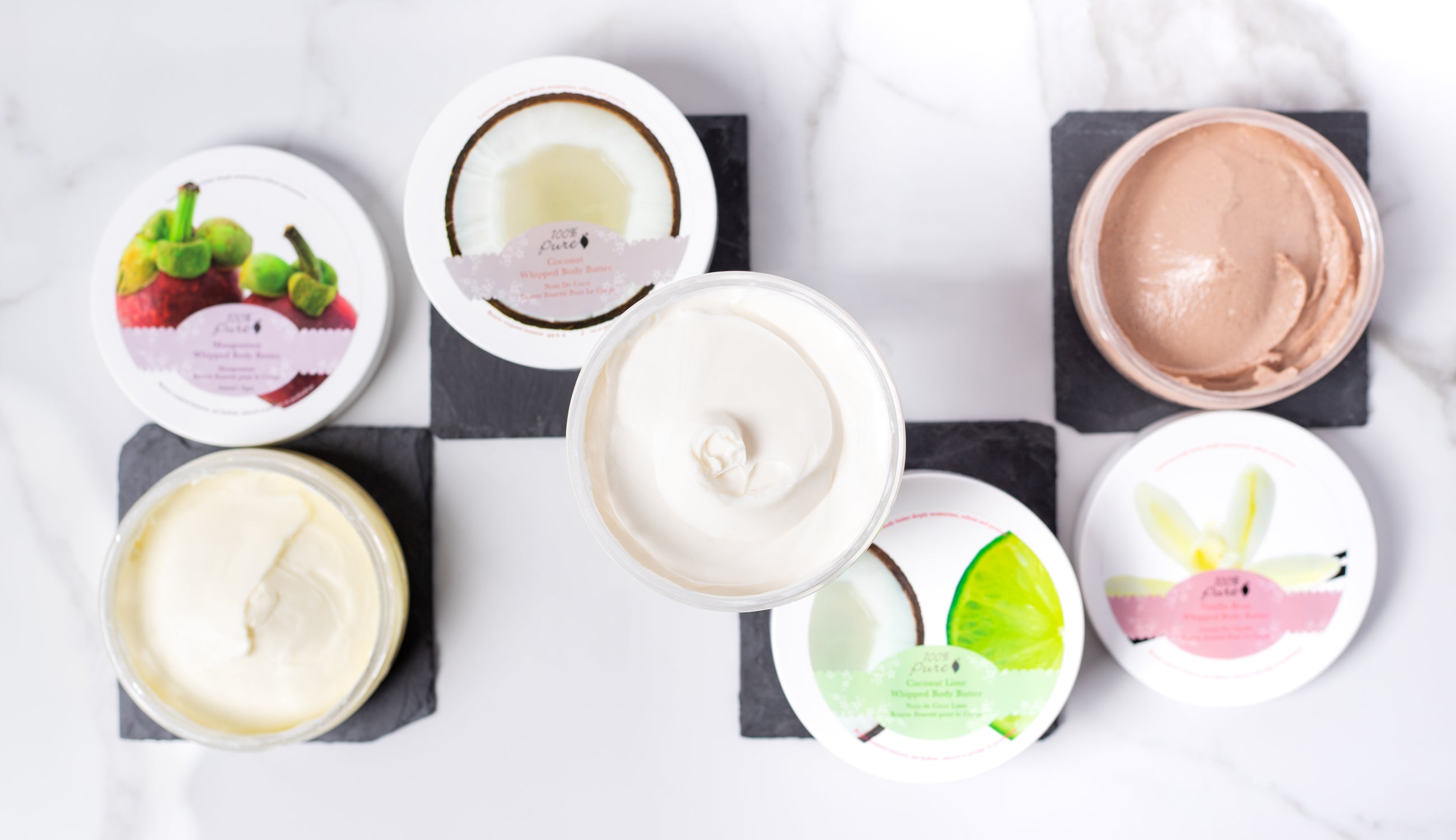
A little unsure which body healing product you should be using for your dry skin? We’ve compiled a quick cheat sheet to what you should be using: body butter or body lotion.
- Body Butter:
- Deep, intensive moisturizing
- Ideal for rough or extremely dry skin
- Can be used all over the body with a concentration on hands, feet, elbows, and legs
- Thicker formula, packed with butter and oils
- Low water content
- Body Lotion:
- Lightweight moisturizing
- Ideal for slightly dry skin
- Can be used all over the body with a concentration on arms, stomach, and thighs
- Lighter formula, easily spreadable
- Higher water content
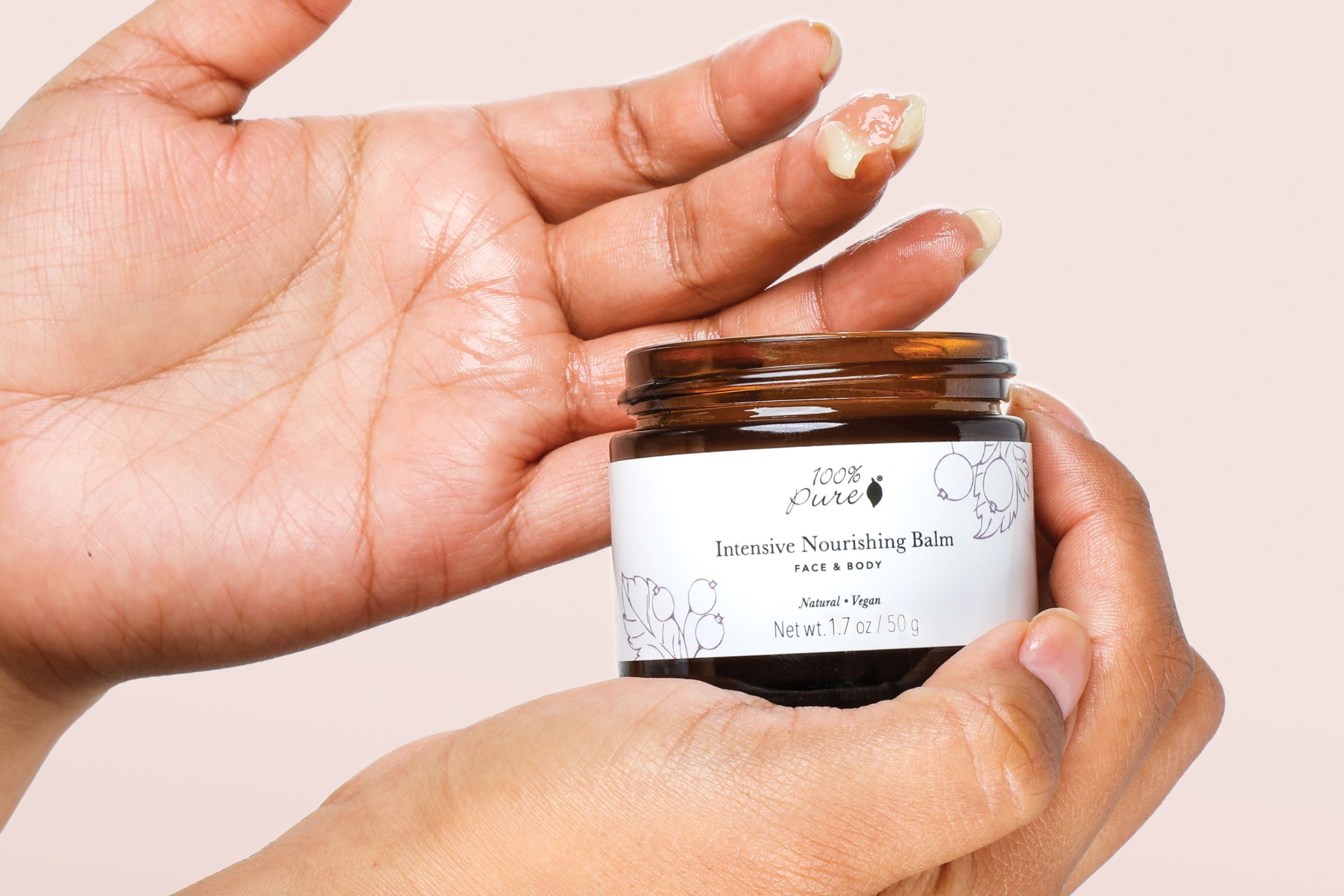
So, now we have a better understanding of body butter vs lotion, what body lotion is, and how it’s distinguished from body butter. But lately, you might have noticed another body product that’s designed to nourish, protect, and help repair the skin.
A body balm is made from a combination of butters and oils, and it’s usually a little bit thicker than a body butter. Thanks to the oils, however, body balms are typically quick to absorb into the skin, especially when you use one with lightweight oils like acai, pomegranate, and goji berry. You’ll find these super beneficial ingredients in our Super Fruit Balm.
In essence, body balms are considered a step above body butters: with their extra-emollient & occlusive properties, they form an extra protective layer around the skin while trapping all those skin-nourishing oils underneath.
And because of these extra-nurturing, protective abilities, body balms are excellent for skin that’s especially damaged and in need of some TLC, whether it’s from cold dry weather, using cleaning products without gloves, or a skin condition like psoriasis or contact dermatitis.
Additionally, body balms are great for those parts of the body that always seem to be dry, especially the elbows and knees. If your go-to lotion or butter isn’t doing the job, apply some balm after bathing, before going to bed.
Body balms are also lovely for preventing dryness, as well – one of the most effective ways to do this is by “slugging”. That’s when you finish off your skin care routine with an extra thick, occlusive product (like a balm) to help lock everything in as you rest while preventing moisture loss in the night hours.
If you decide to use a body balm for slugging, just make sure you’re using one that’s suitable for the face, as well, like our Intensive Nourishing Balm. This rich balm can be used on both the face and body.
The simplest answer all depends on your skin concerns. If you’re looking for a deeper cure to dry, rough skin, body butter is your answer. Because body butter is thicker, it tends to stay on top of your skin longer and work to reduce the loss of moisture from your skin. This protective barrier will keep you more moisturized, for longer.
If you need a light, daily moisturizing for the usual suspects – like your arms and legs – you’ll want to reach for body lotion. This lighter formula is perfect for larger area applications too, because it tends to spread more easily and absorb faster, so it won’t sit on the skin or leave you with greasy or slippery residue.
The main cause of dry skin can be from a variety of factors such as weather, nutrition, the frequency of washing and dehydration. When the natural oils and water are lost or sapped from our skin, our precious epidermis becomes rough and dry. In order to protect the skin's moisture levels, you’ll need to apply a deeply moisturizing body butter for super dry skin, or slather on a lighter fighter for daily use: body lotion.
Whether you’re reaching for a body butter or body lotion, make sure you’re putting on the healthiest body care you can find, and scouring those ingredient labels for suspicious characters. Never compromise health for beauty, and always choose a natural body butter or body lotion that’s free from parabens, phthalates, artificial fragrances, synthetic chemicals, silicones, and toxic preservatives. You’ve only got one body, so take the best care you can!
FAQs: Body Butter vs. Body Lotion – What You Need to Know
1. What is the main difference between body butter and body lotion?
The key difference between body butter and body lotion lies in their texture, water content, and level of hydration they provide:
-
Body Butter is thicker and more concentrated, formulated with natural butters like shea, cocoa, and avocado butter, along with rich oils like argan and rosehip seed oil. It provides deep, long-lasting hydration and forms a protective barrier to prevent moisture loss. It's best for very dry or rough skin, especially on hands, feet, elbows, and knees.
-
Body Lotion is lighter, with a higher water content, making it easier to absorb into the skin. It’s ideal for daily moisturizing on normal to slightly dry skin and works well on arms, legs, and stomach. Lotions provide instant hydration without feeling greasy.
If your skin needs intensive moisture and repair, go for body butter. If you prefer a lightweight, everyday moisturizer, body lotion is your best bet.
2. Which one is better for extremely dry or damaged skin?
For extremely dry or damaged skin, body butter is the best choice due to its thick consistency and higher concentration of nourishing ingredients. Ingredients like cocoa butter, avocado butter, and vitamin E provide deep hydration and create a moisture-sealing barrier that helps restore the skin’s protective layer.
If your skin is severely damaged, cracked, or sensitive, consider using a body balm like Super Fruit Balm or Intensive Nourishing Balm, which offers even stronger repairing and protective properties.
3. Can I use body butter or body lotion on my face?
While both body butter and body lotion are designed for the body, they are not always suitable for facial skin, which is thinner and more sensitive.
-
Body Butter is usually too rich and heavy for the face and may clog pores, especially for those with oily or acne-prone skin.
-
Body Lotion can sometimes be used on the face, but it depends on the ingredients. If it contains fragrances, silicones, or comedogenic oils, it may cause irritation or breakouts.
For facial hydration, it's best to use a face-specific moisturizer such as the Hydra Drench Cream for lightweight hydration or the Restorative Sea Culture Extra Riche Créme for deep moisture.
4. What’s the best way to apply body butter for maximum hydration?
To get the most out of your body butter, follow these steps for optimal absorption and hydration:
-
Apply on damp skin – Right after a shower or bath, your skin is more receptive to moisture. The dampness helps lock in hydration when body butter is applied.
-
Warm it up – Take a small amount of body butter and rub it between your hands to soften it before applying. This makes it easier to spread evenly.
-
Massage into the skin – Focus on extra-dry areas like elbows, knees, and feet, using circular motions to help the product penetrate the skin.
-
Use before bedtime – Since body butter is thicker, applying it at night allows for deep absorption while you sleep.
For an extra hydration boost, layer with body oil before applying body butter. The oil helps seal in moisture, leaving your skin ultra-soft and nourished.
5. How do body butters and lotions help protect the skin barrier?
The skin barrier acts as a protective shield, preventing moisture loss and blocking irritants. If compromised, the skin becomes dry, irritated, and more prone to sensitivity.
-
Body butters are rich in fatty acids, ceramides, and antioxidants that strengthen the skin barrier, repair dryness, and prevent transepidermal water loss (TEWL). Ingredients like shea butter and argan oil help nourish and reinforce the skin barrier.
-
Body lotions provide a lighter layer of hydration and help maintain skin balance, preventing dryness while allowing the skin to breathe.
To keep your skin barrier strong and resilient, opt for natural, non-toxic body care products free from parabens, sulfates, and synthetic fragrances.
Conclusion: Which One Should You Choose?
The choice between body butter and body lotion depends on your skin type, concerns, and hydration needs:
-
Use body butter if you have dry, rough, or damaged skin that needs intensive, long-lasting moisture. It’s perfect for cold weather, extra-dry areas, or overnight repair.
-
Use body lotion if you need a lightweight, daily moisturizer that quickly absorbs into the skin, leaving it soft and hydrated without feeling greasy.
For the ultimate skincare routine, you can incorporate both: apply body lotion during the day for quick hydration and body butter at night for deep nourishment and repair.
No matter which one you choose, always go for natural, non-toxic formulas that respect your skin and provide pure, plant-based hydration. Treat your skin well, and it will glow with health and radiance!
- Tags: Bath & Hair, Bath and Body, March-2025
We carefully hand-select products based on strict purity standards, and only recommend products we feel meet this criteria. 100% PURE™ may earn a small commission for products purchased through affiliate links.
The information in this article is for educational use, and not intended to substitute professional medical advice, diagnosis, or treatment and should not be used as such.








